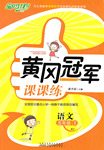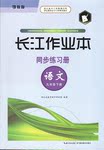题目内容
听力(35分)
第一节:听力理解(共15小题,每小题2分,满分30分)
听下面5段对话或独白。每段对话或独白后有几道小题,从每题所给的A、B、C三个选项中选出最佳选项。听每段对话或独白前,你将有5秒钟时间阅读每小题。听完后,每小题将给出5秒钟的作答时间。每段对话或独白读两遍。
请听第1段对话,回答第1至2题。
1.Where are the speakers?
A.At a restaurant.
B.In a shop.
C.In a supermarket.
2.What does the woman finally order?
A.A chocolate cake.
B.An apple pie.
C.A cup of coffee.
请听第2段对话,回答第3至5题。
3.What does the woman think of the job?
A.Exciting.
B.Difficult.
C.Uninteresting.
4.How much will the woman get a week if she works in the hotel?
A.$140.
B.$420.
C.$240.
5.What does the man advise the woman to do?
A.Stay at home.
B.Take the job.
C.Find a better job.
请听第3段对话,回答第6至8题。
6.How long has the woman studied English?
A.For a couple of weeks.
B.For a couple of months.
C.For a couple of years.
7.Why does the woman feel so discouraged?
A.She finds it hard to write English well.
B.Nobody wants to communicate with her.
C.She finds it hard to learn English grammar.
8.What is the relationship between the speakers?
A.Teacher and student.
B.Father and daughter.
C.Classmates.
请听第4段对话,回答第9至11题。
9.Why did Jane go to the U.S.during the vacation?
A.To attend a summer course in English.
B.To visit an American family, the Smiths.
C.To have a sightseeing with her family.
10.Where did Jane have her daily three meals?
A.At school.
B.In the hotel.
C.In the Smiths’ house.
11.What is the main difference that Jane found in the American classes?
A.The teachers were strict.
B.You could share your ideas.
C.They mainly taught reading.
请听第5段独白,回答第12至15题。
12.What did the speaker have to do before going to school?
A.To feed chickens.B.To have a bath.
C.To go to church.
13.Why didn’t the speaker go to school by bus?
A.He lived near the school.
B.He didn’t have the money.
C.There wasn’t any.
14.Why didn’t his parents need to worry about them when they went out?
A.There weren’t many cars on the roads.
B.There were no robbers or thieves.
C.They were always in the church.
15.What did the speaker think of his life in the past?
A.Easy and comfortable.
B.Hard but happy.
C.Simple and lonely.
第二节:听取信息(共3小题,满分5分)
听下面一段独白后回答下面3个问题。
16.What is the news about?(2分)
____________________
17.Who were killed?(1.5分)
____________________
18.How did the children at the school feel?(1.5分)
____________________
解析:
|
答案:A C C C B B C A A C B A B A B A traffic accident.(2分) A girl and two boys./Three children.(1.5分) They were very upset.(1.5分) 听力材料 Text 1 M:Would you like some dessert now, miss? W:I’d like to see the menu again, please. M:Here you are, miss.The chocolate cake is delicious. W:No, thanks.I don’t like chocolate.I’d rather have a pineapple pie. M:I’m afraid there isn’t any more today. W:Then I’d like to have an apple pie. M:I’m sorry, but that’s gone, too. W:How about some fresh fruit? M:We don’t have any fresh fruit today.All we have now is chocolate cake. W:Then I’ll just have a cup of coffee, please. M:Fine.I’ll bring it right away. Text 2 W:I have found a job at a hotel.But it doesn’t sound interesting. M:How much will they pay you? W:240 dollars a week. M:I’d take it if I were you.You have been looking for a job for a long time and this is the first one you’ve found. W:But it is not what I wanted. M:But you need a job, don’t you? W:Maybe I can find a better job tomorrow. M:It’s possible, but you can always move to another job if you don’t like it. W:Well, I’ll think about it. Text 3 W:I am fed up with studying English, Mr.Black.It seems so impossible for me to learn the grammar.I am such a failure. M:Oh, Kate.Don’t be so discouraged.Take a seat, please. W:I am so tired.Maybe I should drop out before it kills me. M:Now, look, Kate.All of you began to study it not so long ago, uh…just for a couple of months.Everyone began from reading “A, B, C…” just like you.Everything is difficult in the beginning to everyone. W:I know that, Mr.Black.But I can’t focus on it. M:Maybe you are thinking too much about the grammar.But that is not the most important thing in learning.Just relax.Practice and communicate with others more.And then you may find they are just like you too. W:Is that true? M:Yes.Just keep calm and keep trying. W:OK.Thank you very much, Mr.Black. M:You are welcome. Text 4 M:Hi, Jane.It’s nice to see you again.I heard that you went to the U.S.during the vacation. W:Yes, I went to New York to attend a summer course in English. M:Wow.You were lucky.How long did you stay there? W:About 50 days.I went there on July 5th and came back on August 25th. M:Where did you live in New York? W:Oh, I lived with an American family, the Smiths.They were very kind people.Shortly after I arrived, we became good friends.And, living in their house, I could speak English with them every day.Besides, I didn’t need to worry about my daily three meals.They looked after that. M:How nice! And how about the course? W:The course was also very good.The teachers were nice.They taught us to listen, speak, read and write in English, but it was mostly speaking.One interesting thing I found was that the American classes are different from our classes here because they are very free.You can sit anywhere you like in the classroom.You can ask the teacher questions at any time during the class.And you are welcome to share your ideas with the class.I really like this kind of class. M:How interesting! Maybe our teacher should try that. Text 5 Now, you want to know about life in the past.Right? I can tell you.When I was a boy, things were different.I had to get up at six every morning.That was not very bad in summer, but in winter it was cold.And we didn’t have any hot water in the house.We had to wash in cold water.We didn’t have a bathroom.My dad had some chickens.I had to feed them every morning and then I had to walk to school with my little sister.It was two miles to school and two miles back in the evening.But it always seemed longer in the morning when we were going to school.There was a bus, but we didn’t have the money.And we had to go to bed at seven o’clock every night.We couldn’t watch TV because there wasn’t any.On Sundays we had to go to church three times-morning, afternoon and evening.And we couldn’t play outside on Sundays.But it wasn’t all bad.We had some good times.We could go out and our parents didn’t have to worry about us.There weren’t so many cars on the roads then.So the streets were safe to play in.And there were not many robbers and thieves in those days.We had to work hard and we weren’t able to buy those things in the shops today. Life was hard, but it was simple and people were happier. Text 6 Here is the news.A tour bus carrying sleeping middle school students from Montreal skidded off a highway exit Monday morning, killing three children and injuring more than 20 people. 32 students and two bus drivers were on the overnight trip to Canada.They were to participate in a band concert and competition. Andrew, a 12-year-old boy who was on the bus, said that all the children were asleep at the time of the accident.The cause of the crash was not clear now.People said the bus went down a hill and landed on its side.A girl and two boys were killed and several other people were thrown away from the bus.26 people were treated at hospital and most have been allowed to leave. School remained open on Monday.School officials were sent to the homes of the three who died.Children are very upset.Many kids are walking around hall-ways crying and hugging each other |

 黄冈冠军课课练系列答案
黄冈冠军课课练系列答案 长江作业本同步练习册系列答案
长江作业本同步练习册系列答案








